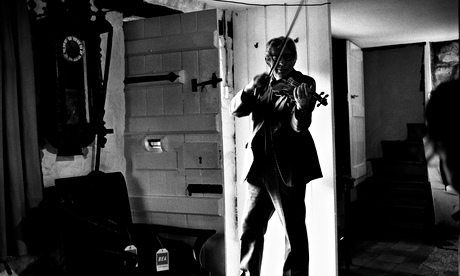
Memory, as the gloriously unreliable narrator of Cider With Rosie probably wouldn't admit, is a strange, distorting thing. If you'd asked me two weeks ago what this book was about, I'd have confidently told you that it's a happy, nostaligic, idealistic evocation of a lost time and place. That it is full of joy and humour. I'd have spoken about fun trips on charabancs, youthful energy, fecund nature and sexual awakening. I'd have laughed about funny local characters like Gran Trill and her lifelong, long-life rivalry with Granny Wallon. I'd perhaps have had an uncomfortable recollection of a midnight murder by a crossroads, and another of a suicide in a millpond. But beyond that, I'd have been sure that this was a book of spring ripening into summer, of blooming life and golden light.
Plenty of contributors to the Reading group would have agreed with me too, judging by comments like the following: "It's a truly beautiful book", "Its beauty, humour and humanity leave me speechless and uplifted each time I read it. It is a lovely read."
Meanwhile, towards the beginning of his introduction to the new Vintage edition of the book, Michael Morpurgo writes: "I remember being mesmerised by the beauty of the prose – a prose poem, a narrative poem, I thought, a word painting." Writing in the Observer back in 1959, Harold Nicolson said of the book: "Its vigour and delicacy animate the loveliness of existence."
Clearly, this is a valid view of Cider With Rosie. I still agree with Nicolson, everyone else, and, reassuringly, myself. This is a lovely book. It's beautiful from the extended descriptions of the Slad valley, right down to the individual words on the page. Even the most casual-seeming sentences have their own trill of joy. Take the following: "It was a frost-bright, moon-cold night of winter … " Why swap those words around? There's no rational reason, but the result is strangely magical, jumping from the page, emphasising the moonlight and the cold, sounding lovely. It's a tiny touch – but the cumulative effect of these flourishes is one of energy, verve, life and sheer delight in language. And that goes a long way, I think, to explaining why this book is so often recalled as bursting with joy and sap and life.
But, of course, it isn't all like that. My memories of Cider With Rosie may not have been wrong – but they were far from the full story. I'd forgotten that the light in the book glows so brightly, the life seems so dazzling, because Lee is such a master of contrast. There is darkness here too. And death. And horror.
Even the famous opening speaks of "bewilderment and terror". The young Laurie Lee doesn't see soft Mother Nature. He sees grass "knife-edged, dark and wicked green". He is lost and tells us:
"A tropic heat oozed up from the ground, rank with sharp odours of roots and nettles. Snow-clouds of elder-blossom banked in the sky, showering upon me the fumes and flakes of their sweet and giddy suffocation. High overhead ran frenzied larks, screaming, as though the sky were tearing apart."
So much for the rural idyll. And so it goes on. One of the first things we learn about the narrator's new home is that nearby are "well-prodded horrors: the bird's gaping bones in its cage of old sticks; the black flies in the corner, slimy dead; dry rags of snakes; and the crowded, rotting, silent soaring city of a cat's grub-captured carcass." We see Laurie cast out of his mother's bed: "my first betrayal, my first dose of hardness, my first lesson in the gentle, merciless rejection of women." We hear ghost stories and lurid details of "sobbing horses kicking out each other's brains". We learn of a hangman who hanged himself after killing his own son. Of tramps who turn bacon green. Of gypsy boys too scared to ask for food because "we set our dogs on gypsies here." Even funny old Granny Trill spends her time foretelling doom with the help of an almanac, and even children's laughter has an edge: "We can't speak for laughing, we can't laugh without hitting each other." Even, as nightjar12 points out, Lee's kind, nurturing sisters are capable of causing shock and terror: "Boys who don't go to school get put into boxes, and turn into rabbits, and get chopped up on Sundays."
And that's before we get to that murder in the woods, the suicide and madness. It's also without mentioning the sadness at the heart of this book about lost time, lost youth, an age passed. An age blasted, in fact, by war. The shadow of the first world war hangs over the start of the book: "All my life was the war, and the war was the world. Now the war was over. So the end of the world was come." The rest of the book, we know, although it is barely mentioned, is racing towards the second world war, not to mention the end of innocence (such as it is), the greying of Lee's mother's beautiful head, the death of the squire, the arrival of buses …
Reading group contributor Redherrings posed the following question last week: "How does Lee strike the right balance between nostalgia/celebration of the past without heading too far into mawkish hand-wringing sentimentality? It's a hard trick and he pulls it off perfectly."
But as I close in on the end of this article, I feel more like turning all that on its head. The wonder is that with so fury and shadow Lee still conjures so much that is beautiful. How on earth does he do it?

